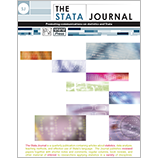Heteroskedasticity- and autocorrelation-robust F and t tests in Stata
Xiaoqing Ye
School of Mathematics and Statistics
South-Central University for Nationalities
Wuhan, China
[email protected]
|
Yixiao Sun
Department of Economics
University of California, San Diego
La Jolla, CA
[email protected]
|
Abstract. In this article, we consider time-series, ordinary least-squares, and
instrumental-variable regressions and introduce a new pair of commands,
har and hart, that implement more accurate heteroskedasticity-
and autocorrelation-robust (HAR) F and t tests. These tests
represent part of the recent progress on HAR inference. The F and
t tests are based on the convenient F and t approximations
and are more accurate than the conventional chi-squared and normal
approximations. The underlying smoothing parameters are selected to target the
type I and type II errors, which are the two fundamental objects in every
hypothesis testing problem. The estimation command har and the
postestimation test command hart allow for both kernel HAR variance
estimators and orthonormal-series HAR variance estimators. In addition, we
introduce another pair of new commands, gmmhar and gmmhart, that
implement the recently developed F and t tests in a two-step
generalized method of moments framework. For these commands, we opt for the
orthonormal-series HAR variance estimator based on the Fourier bases because it
allows us to develop convenient F and t approximations as in the
first-step generalized method of moments framework. Finally, we present
several examples to demonstrate these commands.
View all articles by these authors:
Xiaoqing Ye, Yixiao Sun
View all articles with these keywords:
har, hart, gmmhar, gmmhart, heteroskedasticity- and au-to-cor-re-la-tion-robust inference, fixed-smoothing, kernel function, orthonormal series, testing-optimal, AMSE, OLS/IV, two-step GMM, J statistic
Download citation: BibTeX RIS
Download citation and abstract: BibTeX RIS
|
